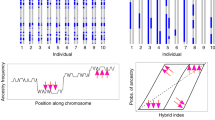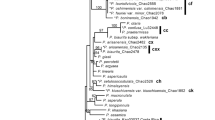Abstract
I AM sorry to say that the postscript of “The Writer of the Article“ to my letter on p. 274 in NATURE of October 27 is not according to facts. It was he who used Trillium, Dirca, and Scoliopus as evidence against “bad pollen” being an indication of hybridity; this evidence appeared to me to be insufficient, and I stated the reason why. In his postscript “The Writer of the-Article” makes no attempt to refute my arguments against his view, but says: “In such cases as Trillium, Dirca, and Scoliopus it is not sufficient for him [meaning me] to suggest that they must be hybrids merely because they have bad pollen,” though I have never suggested this, or referred to Trillium, Dirca, and Scoliopus in any of my previous writings.
This is a preview of subscription content, access via your institution
Access options
Subscribe to this journal
Receive 51 print issues and online access
$199.00 per year
only $3.90 per issue
Buy this article
- Purchase on Springer Link
- Instant access to full article PDF
Prices may be subject to local taxes which are calculated during checkout
Similar content being viewed by others
Author information
Authors and Affiliations
Rights and permissions
About this article
Cite this article
LOTSY, J. Hybridity and the Evolution of Species. Nature 108, 400–401 (1921). https://doi.org/10.1038/108400b0
Issue Date:
DOI: https://doi.org/10.1038/108400b0
Comments
By submitting a comment you agree to abide by our Terms and Community Guidelines. If you find something abusive or that does not comply with our terms or guidelines please flag it as inappropriate.



